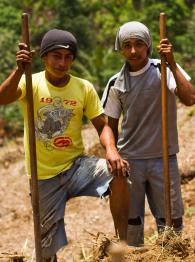
About the Project
This project is one of the 2013 WISE Awards finalists.
The Tutorial Learning System (in Spanish, Sistema de Aprendizaje Tutorial – SAT) is an innovative rural education program that provides targeted learning opportunities for rural populations. Its education model provides access to secondary and technical education for rural youth and adults in their own communities while they engage in and/or continue working on their agricultural and livelihood pursuits in the rural areas in which they live.
Context and Issue
Forty-one percent of Nicaraguans live in rural communities. In 2001, the net secondary school attendance rate across these communities was 35.6 percent, with 15.1percent of males and 23.6 percent of females attending school. For these rural students, access to secondary education is essentially non-existent. Of the 1.4 million school-aged youth (10 to 19 years old), UNICEF estimates that 50 percent are not matriculated in secondary education and that only a third of the population graduates from high school.
Rural communities bear the brunt of the nation’s poverty, housing 63 percent of the poor and 78 percent of the extremely poor, 25 percent of whom survive on less than one dollar per day. Since rural students are left with few options for advancement, they often move to larger cities or migrate to find work. Between 2002 and 2007, half a million Nicaraguans aged 18 to 30 left the country to seek employment.
The education issues in rural regions are irrelevant rural secondary curriculum; lack of access to secondary education in isolated rural communities; the need for a curriculum that blends theory and practice to enhance rural community development and rural livelihoods.
Education and opportunities for employment in rural areas can help combat migration to larger cities and other countries. Additionally, qualified individuals can then help improve the quality of life in isolated rural communities with relevant skills.
Solution and Impact
The SAT project model is based on a non-formal education program which utilizes a “learn by doing” methodology to promote rural education and community development in marginalized communities. It integrates relevant theory and practice, based on each community’s land resources and economic potential. For example, students learn mathematics and science in the context of growing their own vegetables and creating a business to sell their produce. Thus, students develop a multitude of capacities and skills that will help them to contribute to their family’s income.
The SAT secondary school program is designed to provide quality secondary education to remote rural communities that have little or no access to public education programs. SAT’s curriculum particularly emphasizes community development, entrepreneurship, and sustainable agricultural practices.
In 2007, Fabretto introduced SAT to 25 remote Nicaraguan communities. Today this effort has expanded to over 40 communities and has effectively brought high-school instruction to young people who otherwise had little chance of attending secondary school. The program, which is fully recognized and accredited by Nicaragua‘s Ministry of Education, helps students advance to become productive adults or pursue college studies. Fabretto’s technical staff, who are now experts in the SAT methodology, train tutors in three intensive, week-long sessions per year. Fabretto also receives ongoing pedagogical support from FUNDAEC, the founder of SAT in Colombia.
In 2015, Fabretto introduced a new model of the SAT program, called “SATec,” which offers technical training and personal development courses in communities that have access to the Nicaraguan government’s Saturday secondary school program. SATec courses, which run between 6-12 months in duration, use SAT’s “learning by doing”, “learning by earning”, and community service-oriented approach and respond to the agricultural and market demands of each community.
Fabretto is actively working with socially-responsible corporate partners, such as Burke Agro, Mercon Coffee and Sweet Progress, to link students, families, and local cooperatives to markets. Fabretto has also built a rotating fund to offer credit to SAT and SATec students and families, which it intends to grow in the future.
In 2019, through a partnership with Tinker Foundation and the University of Illinois Department of Agriculture, Fabretto began a rigorous impact evaluation of SAT, which will assess the program’s impact on youth’s socio-economic well-being.
Future Developments
Over the past several years, Fabretto has advanced in its goal to expand from “learning by doing” to “learning by earning,” which is designed to enable rural youth to continue their education while contributing to the family income through entrepreneurship or improving production on the family farm. Through SAT and SATec, rural families have accessed training and credit that support crop diversification, climate-sensitive cultivation methods, improved inputs, and links to value chains.


